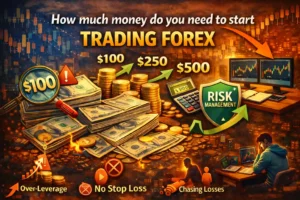Hey, it’s Mark here. We’ve been thinking a lot lately about all the feedback and topics you all submitted, thank you for all the support along the way. I think we will offer a lot of value to traders across the board here in these posts. And I was on a podcast recently on Stephen Goldstein‘s podcast, and he was asking me some questions about, the things I wish that I knew when I first started trading that I know now.
Thinking about my trading career over the past 10 years. I realized that I spent way too much time either not having the right process or not understanding the monetary side of things.
There are three things that I wished I knew when I first started trading that I personally believe would have just sped up my Forex journey just a lot more and make me feel better about the journey as well. This may save you a lot of time, energy and shorten your learning curve in the currency markets. I’m very excited to get into these three things in dept:
- Processes (Journaling, Trading Checklist, etc)
- How to minimize the monetary impact
- How to do proper forecasting
Trading Processes
Let’s talk about the first thing: Processes. Why are processes important? Well, essentially, what you’ll find is, as a trader, having a great process will give you a great outcome. Many beginner forex traders tend to focus on the outcome (aka. Future Performance). For example, either you were trading right now or you’re looking to get into Forex markets or you’re just a beginner in financial markets or stock trading industry.
Think about it. Are these your main motives for trading forex:
- How much money I can make
- How much profit I can make
- How many pips I can make
- How can I buy the Lamborghini and luxury homes
- etc
This is why 90% of the traders lose 90% of their trading account within 90 days of trading (aka. the 90-90-90 Rule).
What are your processes
There are many different ways and forms for doing the processes. At Falcon FX, these are the popular trading strategies when it comes to trading processes:
- Journaling. A trading journal is one of the best things you can do to achieve success in forex trading. A trading journal is your own personal trading diary where you record your trade activity, trades, your wins, losses, and results. By doing this, you’ll be able to review your trading mistakes and successes. It is a way for you to track what you did right and what you did wrong when you trade. Did you know that traders who have a journal trade more consistently and earn more money than traders who do not journal?
- Trading Checklist. This is something that gets talked about a lot but yet implemented by beginner traders that just got into fx trading. You check list should base on a series of questions you ask yourself throughout trading processes. Asking good questions in trading is Single-handed one of the most important things you can do (pretty much anything in life).
- Trading Plan. A trading plan is an essential tool in Forex trading. It allows traders to clearly define their trading goals, strategies and to prepare for possible situations they may experience during the trading process. Having a trading plan ensures that the trader follows a consistent approach and can avoid making rash decisions on the spot. Also, a trading plan allows traders to know exactly what to do during different market conditions and prevent them from entering trades they aren’t fully prepared for.
Trading does not come easily to most people. Many people think trading is a get-rich-quick scheme, but in reality, it requires a lot of dedication and hard work. If you want to have a successful trading plan, you ought to have one. This trading plan will set your expectations for trading and will also help you to achieve success in trading.
Because some people have trading plans, but they don’t follow them. So days and weeks go by. You don’t know whether you’re sticking to your plan or not. When I just started trading forex, I didn’t have any processes at all, never had anything like journaling to trading checklists. So my advice to you as a trader is to start having a strategy, plan, and checklist. You will be way ahead of many other traders who make the same mistakes as I did.
Minimize Monetary Impact
The second point is about minimizing the monetary impact in trading currency pairs. Minimizing the monetary impact of the trades all boils down to risk management. When looking at a chart, it is important to remember that even if the price of a currency pair is moving slowly at the present moment it could be moving fast later. It is best to wait for the optimal moment to enter the market, and not to over react to every tick that happens as you watch.
At FalconFX, students are taught to risk 1% per trade. For example, we’ve got let’s say a ten thousand pound account is roughly 10K and you’re risking one percent. If you’re risking one percent per trade, you’re technically risking one hundred pounds per trade.
Now think about it, your focus has shifted from risking £100 to risking 1%. Your brain starts associating risk with 1% instead of 100, subconsciously speaking, you’re at ease, your mind is at ease, you’re not constantly being anxious placing a trade. You forget about the one hundred pound figure. And why is that important? Because look at the difference between that 10k and one hundred pounds. That makes you feel emotional.
I’m sure by now you know the importance of risking 1% per trade. It’s just understanding how to minimize the impact because it would have saved me a lot of time. I wasted some seven weeks at one point just because I was taking on the emotional weight of a larger figure. And I found it difficult. I really did. And for some people, they find it a smooth process. They go from trading five thousand ten thousand twenty fifteen hundred plus and they have a smooth process.
Proper Forecasting
The third party is forecasting now, arguably forecasting this the crucial part of becoming a consistent forex trader.
So forecasting the possibilities, forecasting the probabilities, very, very important. The reason why forecasting I hold so great is that if I would have learned how to forecast at the beginning, if I had some guidance, you know, moments back then when I first started learning with stocks at 18 and they said to me, Mark, why wouldn’t you just I want to focus on processes. I don’t you to think about the money side of things. I want you to focus on the actual amount that you’re risking.
And also, I want you to forecast why do I want you to forecast? Well, I want you to start trading your subconscious mind to be prepared fully for the possibilities, the possibilities, understand the problem and the possible. You’ve probably seen the video that I’ve done before on YouTube about the problem, the possible, and just really understanding the fact that when you can learn to map out those scenarios, so let’s say you’re trading, you’ve got a trading week.







